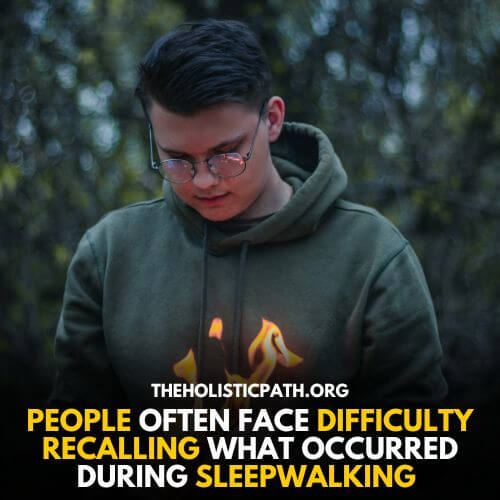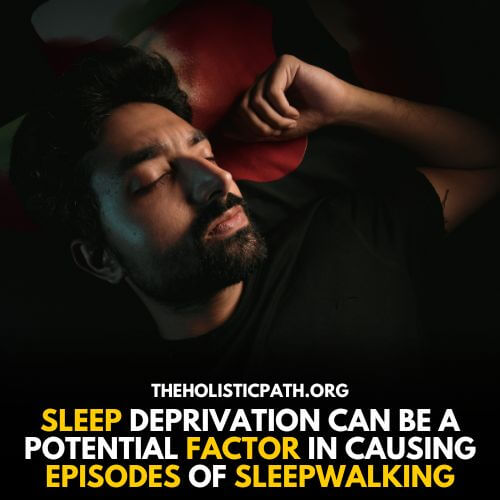Sleepwalking is a sleep disorder that involves walking or performing other complex behaviors while still asleep. It usually occurs during deep sleep and can be triggered by factors such as stress, fatigue, and some medications.
While sleepwalking is generally not seen as a serious health concern, it may sometimes be associated with underlying psychological problems like depression. In this article, we will discuss the query ‘Is sleepwalking a sign of depression’ and how it might be treated. We will also explore the potential causes of sleepwalking and its symptoms.
What Is Sleepwalking?
Sleepwalking is now known to be a disorder that falls under parasomnias. This type of disorder is categorized by abnormal behaviors in response to the sleep-wake transition.
Sleepwalking involves periods of wakefulness during sleep, in which the individual appears to be awake but is actually asleep. The person may engage in complex behaviors such as getting up, walking around, talking, and even performing elaborate activities.
Is Sleepwalking a Sign of Depression – 8 Major Symptoms
Sleepwalking is more common in children than adults, but it can occur at any age. Some of the most common symptoms associated with sleepwalking include:
- Moving around while seemingly asleep
- Engaging in activities without awareness of their surroundings
- Crying, talking, or making other noises during sleepwalking episodes
- Standing up and walking with eyes open but appearing to be in a trance-like state
- Becoming confused or disoriented upon waking up from a sleepwalking episode
- Having difficulty recalling what occurred during a sleepwalking episode
- Being unusually tired the following day after an episode has occurred
- Suffering from frequent headaches or nightmares
- Experiencing sudden mood changes, such as depression, irritability, and anxiety
- Waking up in an unfamiliar place

8 Main Causes of Sleepwalking Leading to Depression
Sleepwalking can have many different causes, some of which are psychological in nature. Stress and anxiety can be major causes of sleepwalking, as these emotions can disrupt the body’s normal sleep cycles. In some cases, a genetic predisposition may be to blame.
1. Stress
Stress is a major contributor to sleepwalking, as it can lead to difficulty in falling asleep and staying asleep. Stressful situations can also lead to an overstimulation of the nervous system, affecting the brain’s ability to shut down for restorative sleep.
Here Are a few other relevant causes:
- Difficulty falling asleep and staying asleep
- Activation of the body’s “fight or flight” response
- Increase in heart rate and shallow breathing
- Overstimulation of the nervous system
- Disruption of the brain’s ability to shut down for restorative sleep.
- Difficulty entering into deeper stages of sleep
- Lack of healthy, restful sleep
- Increase in anxiety levels and other negative emotions.
2. Migraine
Migraines can be a contributing factor to sleepwalking. Migraines are intense headaches that can come with other symptoms, such as nausea and fatigue. These headaches can disturb sleep patterns, leading to increased fatigue and restlessness during the night. This could potentially lead to episodes of sleepwalking.
Here Are a few other relevant causes:
- Disruption of standard sleep patterns
- Increased fatigue and restlessness during the night
- Potential episodes of sleepwalking
- Increase in stressed or anxious sleep patterns
- Potentially longer episodes of sleepwalking
- High levels of fatigue during the day following a migraine episode
- Abnormal brain activity during episodes of sleepwalking
- Increased risk for psychological disorders
3. Fever
Fever can also be a detrimental factor to sleepwalking. A virus or bacterial infections usually cause fevers, and they can lead to changes in the brain’s activity. When our bodies are dealing with a fever, we may experience restlessness, fatigue and difficulty focusing – all of which can lead to episodes of sleepwalking. Fevers may also affect the body’s ability to regulate its own temperature, which could further contribute to individual sleepwalking.
Here Are a few other relevant causes:
- Changes in brain activity
- Restlessness and fatigue
- Difficulty focusing
- Episodes of sleepwalking
- Reduced ability to regulate body temperature
- Disorientation or confusion upon waking up from a sleepwalking episode
- Unusual tiredness the following day after an episode has occurred
- Increase in headaches, nightmares and other symptoms associated with fever
4. Breathing Disorders
Breathing disorders such as sleep apnea, asthma and allergies can all contribute to episodes of sleepwalking. Sleep apnea for example is characterized by pauses in breathing during the night, which disrupts our normal sleeping patterns and can lead to restlessness and fatigue.
Asthma and allergies can also cause difficulty breathing, which can lead to shallow breathing and trouble entering into deeper stages of sleep. This could potentially trigger an episode of sleepwalking as well.
Here Are a few other relevant causes:
- Disruption of normal sleeping patterns due to pauses in breathing
- Increase in restlessness and fatigue
- Shallow breathing due to difficulty with respiratory issues
- Difficulty entering into deeper stages of sleep
- Problems with identifying triggers for asthma or allergy attacks during sleep
- Increased risk for other sleeping disorders such as insomnia
- Difficulty maintaining restful sleep due to breathing disorders or allergies.
5. Sleep Deprivation
Sleep deprivation can also be a potential factor in causing episodes of sleepwalking. When we don’t get enough sleep, our bodies may become overly tired and exhausted, leading to restlessness during the night. Additionally, sleep deprivation can also lead to cognitive impairments such as difficulty concentrating and increased anxiety levels – both of which can potentially contribute to episodes of sleepwalking.
Here Are a few other relevant causes:
- Disruption in normal sleeping patterns due to exhaustion
- Restlessness during the night
- Difficulty concentrating and focusing
- Increase in anxiety levels
- Potential episodes of sleepwalking during the night
- Abnormal brain activity during an episode of sleepwalking
- High fatigue levels the following day after a sleepwalking episode has occurred
6. Parkinson’s Disease
Parkinson’s Disease is a neurological disorder that can also potentially lead to episodes of sleepwalking. People with this condition are affected by motor impairments and can experience difficulty controlling their movements at night, which may trigger an attack of sleepwalking.
Here Are a few other relevant causes:
- Motor impairments that can cause difficulty controlling movements during the night
- Tremors or twitches that may disrupt sleeping patterns
- Potential episodes of sleepwalking during the night
- Increased risk for other sleeping disorders such as insomnia
- Problems with identifying triggers that lead to an episode of sleepwalking
- Difficulty maintaining restful sleep due to the motor impairments associated with Parkinson’s Disease.
7. Restless Leg Syndrome
Restless Leg Syndrome (RLS) is another condition that may potentially trigger an episode of sleepwalking. Here Are a few other relevant causes:
- Uncomfortable sensations in the legs accompanied by an intense urge to move them
- Disruption to the natural sleeping process
- Potential episodes of sleepwalking during the night
- Abnormal brain activity during an episode of sleepwalking
8. Certain Medications
Certain medications can also increase the risk of episodes of sleepwalking. Here Are a few other relevant causes:
- Antidepressants, antihistamines, and antipsychotics can disrupt normal sleeping patterns
- Sedatives prescribed to treat insomnia
- Difficulty maintaining restful sleep due to the medications taken.

5 Main Mental Health Issues Connected to Sleepwalking
Mental health issues can also be connected to sleepwalking. People with bipolar disorder or schizophrenia may also experience episodes of sleepwalking due to the mental health issues they are dealing with. Here Are a few other relevant causes:
- High levels of anxiety and stress
- Nightmares
- Schizophrenia
- Difficulty entering into deeper stages of sleep due to depression
- Episodes of sleepwalking that can be triggered by mental health issues
3 Main Medical Issues Connected to Sleepwalking
Certain medical conditions can also increase the likelihood of experiencing episodes of sleepwalking. Here Are a few other relevant causes:
- Hypoglycemia or anaemia may increase the risk of sleepwalking
- Neurological disorders including epilepsy and seizures
- Disturbance to the natural sleeping process
Children and Sleepwalking
Sleepwalking in children is more common than in adults, with up to 20% of all children experiencing sleepwalking episodes. Here are a few other features:
- Physical and mental changes such as puberty can increase the risk
- Higher levels of stress and anxiety due to school and social pressures
- Lack of awareness and understanding that sleepwalking is a disorder
- Finding coping mechanisms to reduce the intensity and frequency of sleepwalking episodes.
8 Major Risk Factors of Sleepwalking
There are several factors that can increase an individual’s risk of experiencing episodes of sleepwalking. These include things such as genetics, age, and lifestyle choices. If a person has a family history of sleepwalking, then they may be more likely to experience it themselves.
Here are a few other factors:
- Genetics – a family history of sleepwalking
- Age – more common during childhood
- Lifestyle choices such as drinking alcohol or using certain medications
- Stressful life events and situations
- Poor sleeping habits such as lack of sleep or going to bed late
- Environmental factors such as noise pollution, light pollution, and temperature changes
- Certain medical conditions such as epilepsy and seizure disorders
- Taking certain medications which can have side effects that induce sleepwalking.
When to Consult a Doctor For Sleepwalking?
If you or your child is experiencing frequent episodes of sleepwalking, then it may be time to consult a doctor. A physician can help identify any underlying medical conditions that may be contributing to the episodes and provide advice on ways to reduce their frequency.
Here Are a few other relevant features:
- Frequent episodes of sleepwalking
- Identifying any underlying medical conditions that may be contributing to the episodes
- Advice on ways to reduce the frequency of sleepwalking episodes
- Suggestions for lifestyle changes that can help reduce severity of sleepwalking episodes
- Consideration of medications that can help reduce severity of sleepwalking episodes
- Diagnosis of other underlying sleep disorders such as insomnia
- Recommendations for how to create a comfortable sleeping environment
- Strategies on how to manage stress and anxiety levels
- Education about the dangers of sleepwalking and how to stay safe while episodes occur
- Referrals to specialists who can provide more specific advice, treatment plans, and therapies.
5 Major Ways How to Deal with Sleepwalking to Avoid Depression
Sleepwalking is a potentially dangerous sleeping disorder that can lead to injury or distress. Knowing how to deal with it properly can make a world of difference in preventing episodes and providing relief afterwards.
Here are five ways that may help one manage the condition more effectively.
1. Identifying Triggers
One of the most important steps in managing sleepwalking is to identify any triggers that may be causing it. This can include environmental factors such as noise or light pollution, stressors, and certain medications.
Once these are identified, it will be possible to create a plan for how to avoid or manage those triggers. Here are a few other relevant tips:
- Keep a sleep journal to learn more about your sleep patterns
- Identify any environmental triggers such as noise or light pollution
- Take note of stressors and other lifestyle factors that may be triggering the episodes
- Consider whether medications are causing or contributing to the problem
- Talk to your doctor about possible underlying medical conditions
- Seek professional help to identify any other sleep disorders that may be contributing.
2. Practice Good Sleep Hygiene
Creating good sleep hygiene habits can be a great first step in managing sleepwalking episodes. Here are a few other relevant tips:
- Develop a regular bedtime routine
- Stick to a consistent sleeping schedule
- Avoid activities like heavy meals or exercising close to bedtime
- Create a comfortable and relaxing sleeping environment
- Reduce distractions such as screens or loud noises.
3. Reduce Stress Levels
Stress can be a major trigger for sleepwalking, so it is important to make time to manage and reduce stress levels in order to reduce the frequency of episodes. Here are a few other relevant tips:
- Deep breathing exercises
- Yoga or other calming physical activities
- Meditation or guided relaxation techniques
- Talking to a trusted friend or loved one
- Counselling or therapy for more serious issues.
4. Use Safety Measures
Safety measures can be used to help protect the individual during sleepwalking episodes and reduce any potential harm that could come from them. Here are a few other relevant tips:
- Locking windows and doors before bedtime
- Removing dangerous objects from the sleeping area
- Putting up safety gates in stairs or other areas where the individual could become injured
- Using night lights to ensure a well-lit sleeping environment
- Having someone stay in the same room as the sleepwalker to provide supervision.
5. Seek Professional Help
It may be beneficial to seek professional help from a doctor or sleep specialist if necessary. Here are a few other relevant tips:
- Seeking advice from a doctor or sleep specialist
- Evaluating the underlying causes of sleepwalking
- Prescribing medications if necessary
- Making lifestyle and dietary changes
- Using cognitive behavioral therapy techniques.
- Referring to a sleep center for further assessment and treatment.

Conclusion
Sleepwalking is a common disorder that can be disruptive and potentially dangerous if not managed properly. However, it is possible to reduce the frequency and severity of episodes by following the above tips, such as practising good sleep hygiene, reducing stress levels, using safety measures, and seeking professional help. Sleepwalking can be managed and treated successfully with the right strategies in place.
It is important to remember that everyone’s needs differ, so it is best to consult a doctor or sleep specialist for personalized advice. With the right care and support, individuals can get the help they need to manage their sleepwalking episodes.
Frequently Asked Questions
How do I stop myself from sleepwalking?
1. Develop a regular bedtime routine
2. Stick to a consistent sleeping schedule
3. Reduce stressful activities close to bedtime
4. Create a comfortable and relaxing sleeping environment
5. Reduce distractions such as screens or loud noises.
Can sleepwalking be cured?
Sleepwalking cannot be cured, but it can be managed and treated with lifestyle changes, medications, therapy, or a combination of these methods. It is essential to work closely with a doctor or sleep specialist to develop an individualized plan that best suits the needs of the individual.
What is the brain doing when sleepwalking?
The exact cause of sleepwalking is unknown, but it is believed to occur during the deeper stages of non-REM sleep when the brain’s activity slows down due to decreased arousal.
During this time, there can be a disconnect between the parts of the brain that are responsible for controlling behavior and the ones that control emotions and impulses. This can lead to the individual engaging in activities such as sleepwalking without being consciously aware.
It is also thought that sleep deprivation and stress can contribute to the likelihood of sleepwalking episodes.
Can Sleepwalkers see you?
No, sleepwalkers are generally not conscious of their surroundings and cannot see you. However, they may react to loud sounds or physical contact if startled. It is best to avoid startling a sleepwalker as this can cause them to become disoriented or confused when woken up abruptly.
How common is sleepwalking?
Sleepwalking is a fairly common disorder that affects up to 4% of adults and 17% of children. The frequency, duration, and severity can vary between individuals but it usually peaks in childhood and tends to decrease with age. It is more likely to occur in those who have family members who also sleepwalk.
Is sleepwalking a trauma response?
In some cases, sleepwalking may be a response to trauma or psychological stress. It is important to recognize any underlying issues that could be causing the sleepwalking in order to find an appropriate treatment plan.
Additionally, it is essential to ensure that safety precautions are taken when there is a risk of injury due to sleepwalking episodes.
Can Sleepwalkers unlock doors?
Sleepwalkers can potentially unlock doors, so it is important to take safety measures such as installing locks that require keys or codes to open.
Additionally, remove any dangerous objects from their path in order to minimize the risk of injury. If possible, try to wake up the sleepwalker gently and guide them back to bed without startling them.
Can sleepwalking harm others?
Sleepwalking can potentially lead to accidental injury or harm, so it is important to take safety precautions and contact a doctor for advice if necessary.
When interacting with a sleepwalker, remember not to startle them as this can cause confusion or disorientation when woken up abruptly. It is best to gently guide the person back to bed without trying to wake them up fully.
Do sleepwalkers get violent?
Sleepwalkers generally do not become violent during sleepwalking episodes, but they can sometimes be confused or disoriented when woken up abruptly.
It is important to take safety precautions and contact a doctor for advice if necessary. Additionally, try to avoid startling the sleepwalker as much as possible and gently guide them back to bed without trying to wake them up fully.
References:
Umair Akram (April 19, 2019). The Relationship between Depression and Insomnia Symptoms Amongst a Sample of UK University Students. https://www.sleepmedres.org/journal/view.php?number=135
Allison G. Harvey, Lisa S. Talbot (April 8, 2012). Sleep Disturbance in Bipolar Disorder Across the Lifespan. https://www.ncbi.nlm.nih.gov/pmc/articles/PMC3321357/
